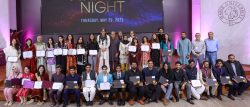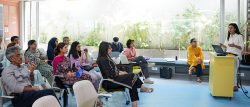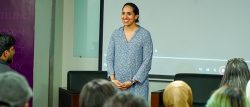Organized by Tate Research Centre: Asia in partnership with Habib University and the British Council with support from the Lahore Biennale Foundation, the ‘Karachi Seminar: Critical Perspectives on Art and Education’ was a day-long event held at Habib University on the 24th of March, 2018.
The main aim of the seminar was to “combine research, politics and visual culture in the contemporary art world, to explore new geographical and cultural formations from which to advance the decolonial project, and to experiment with models of critical pedagogy that move beyond the conventions of art schools and conventional exhibition formats.” The seminar was planned keeping in mind the writers, curators, artists, and academics in Pakistan, and to give them platform for sharing and presenting research.
These participants included Nada Raza, Adnan Madani, Iftikhar Dadi, Mariah Lookman, Saira Ansari, Nausheen Anwar, CAMP, Tentative Collective, Karachi LaJamia, Jyoti Dhar, Saloni Mathur, Samina Iqbal, Fiza Khatri, and Sophia Balagamwala.
”
Karachi Seminar: Critical Perspectives on Art and Education | #HappeningNow pic.twitter.com/Q0DVQfIK8Q
— Habib University (@HabibUniversity) March 24, 2018
The biennial exhibitions have opened doors for new ways to acquire funding, and the seminar shed light on how artists and academics respond to the question of how in Karachi, does the biennial identify and address its audience, and how is the site of the exhibition understood as a conversational space.
The event started with introductions followed by the first panel titled ‘Urban Sites: Working Through the City’ which talked about the approaches to urban developments, regeneration, civil rights, public memory, and the notion of the artist as a community or social worker. The event was successful in bringing forth enlightened discussions on the stated topics. Some of the key presentations of each panel discussed are highlighted below.
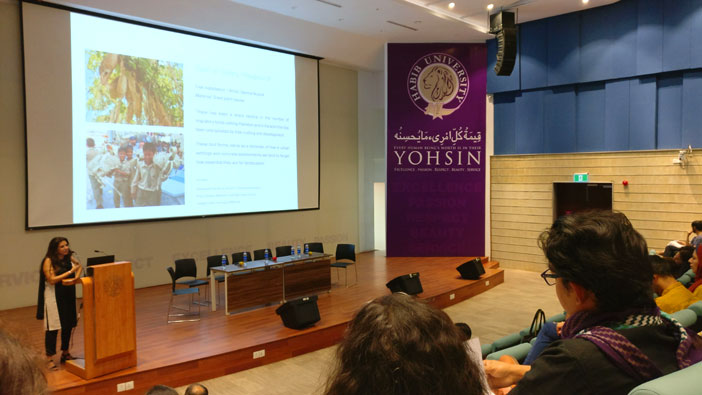
The presenter for DIY City was Saima Zaidi, an assistant professor in the Communication and Design Programme and Director of the Centre for Media and Design at Habib University. She is a core member of Numaish Karachi, an award winning multi-disciplinary collective which aims to open up public space for cultural production. DIY City comprises multidisciplinary interventions aimed at opening up the public realm as an open air gallery, laboratory, classroom, playground – and transforming it into an inclusive urban retreat. DIY city designed a do it yourself program working on design, culture, science and technology to encourage community engagement which resulted in the development and implementation of an undergraduate course at HU.
The Tentative Collective presented next on their project titled ‘Shershah Aur Deegar Kahanian’. The presentation focused on the process of working and engaging with ideas of transitioning economies in Karachi. The project highlighted its work with an unpublished poet, third generation of cap makers, a carpet making business in the process of being sold, and an investor/ middleman who dealt in metal scrap in the vast junkyards/ warehouses of Shershah, Karachi. The Tentative Collective is made of artists, curators, teachers, and collaborators from diverse backgrounds which include fishermen, housewives, and domestic workers.
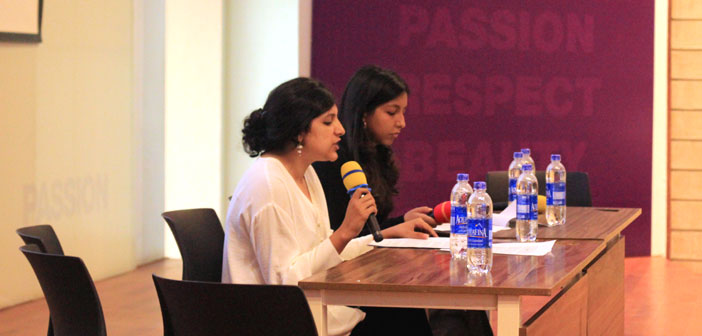
Shahana Rajani and Zahra Malkani are an artist duo based in Karachi exploring the infrastructure and development in the rapidly transforming city. Shahana and Zahra are also cofounders of the Karachi LaJamia, an anti-institution seeking to politicise art education and explore new radical pedagogies and art practices, and their presentation titled THE RAKSHAS RAILWAY AND UNRULY LINES tracked the violent colonial history and the transformations, degradation, ruptures and restorations of the railway infrastructure in Pakistan.
The second panel called ‘Negotiating History: Recuperating Artistic Practice and Exhibition Histories’ brought together studies of the artistic practices of woman artists.
”
#Karachi Seminar: Critical Perspectives on Art and Education | #HappeningNow – Negotiating History: Recuperating Artistic Practice and Exhibition Histories | @Tate pic.twitter.com/h2NPsqi36V
— Habib University (@HabibUniversity) March 24, 2018
Mariah Lookman is a Pakistani researcher, writer and artist, her presentation titled ‘River in an Ocean’ – centred around unpacking aspects of the world of artist LalaRukh and understanding her contemplations from a feminist activist perspective.
‘Karachi Pop: Experiments and Innovation in Artistic Practice 1989-1999’ was an interesting session by Aziz Sohail, an art curator, writer and researcher based in Pakistan. The presentation explored the provocative and experimental art making of the city in the 1990’s. It explored the Karachi Pop movement, also arguing that it was a feminist movement led by women who examined their role in public space.
The second panel ended with an enlightening discussion moderated by Saloni Mathur, professor of art history at the University of California.
Panel 3: Watery Biennales was based on “critical perspectives on biennalization along the Indian ocean” and the session topics ranged from Considering biennials through a comparative frame consciously set against the backdrop of the Lahore biennale, Critical responses to the Colombo Art Biennale, the first edition of the Karachi biennale and the Sharjah/Kochi-Muzirus models. The effect the biennale has on infrastructure, art production and circulation was discussed.
“Whose City Is it Anyway?” comprised on notes on the inaugural Karachi Biennale, which took place last fall amidst claims of open engagement and urban renewal. The aim of the biennale is to bring art outside the confines of galleries, and into the city and to reclaim heritage sites. A biennale promises great potential for institutional growth in Karachi and placed the city on the international network of Biennales, but how do its claims hold up in the execution of the event? The biennale is affected by the city’s infrastructure and financial capabilities. The presentation was by Fiza Khatri, a Karachi based artist who co facilitates Karachi Crit Group and by Sophia Balagamwala, an illustrator and artist in Karachi and co facilitator of Karachi Crit Group.
The panel ended after more sessions discussing and comparing the Biennales, with a discussion moderated by Dr. Iftikhaar Dadi, an Associate Professor at Cornell University.
The discussion was followed by closing remarks and thanks from the organizers.
Read Art Now Pakistan’s coverage of the event here.


